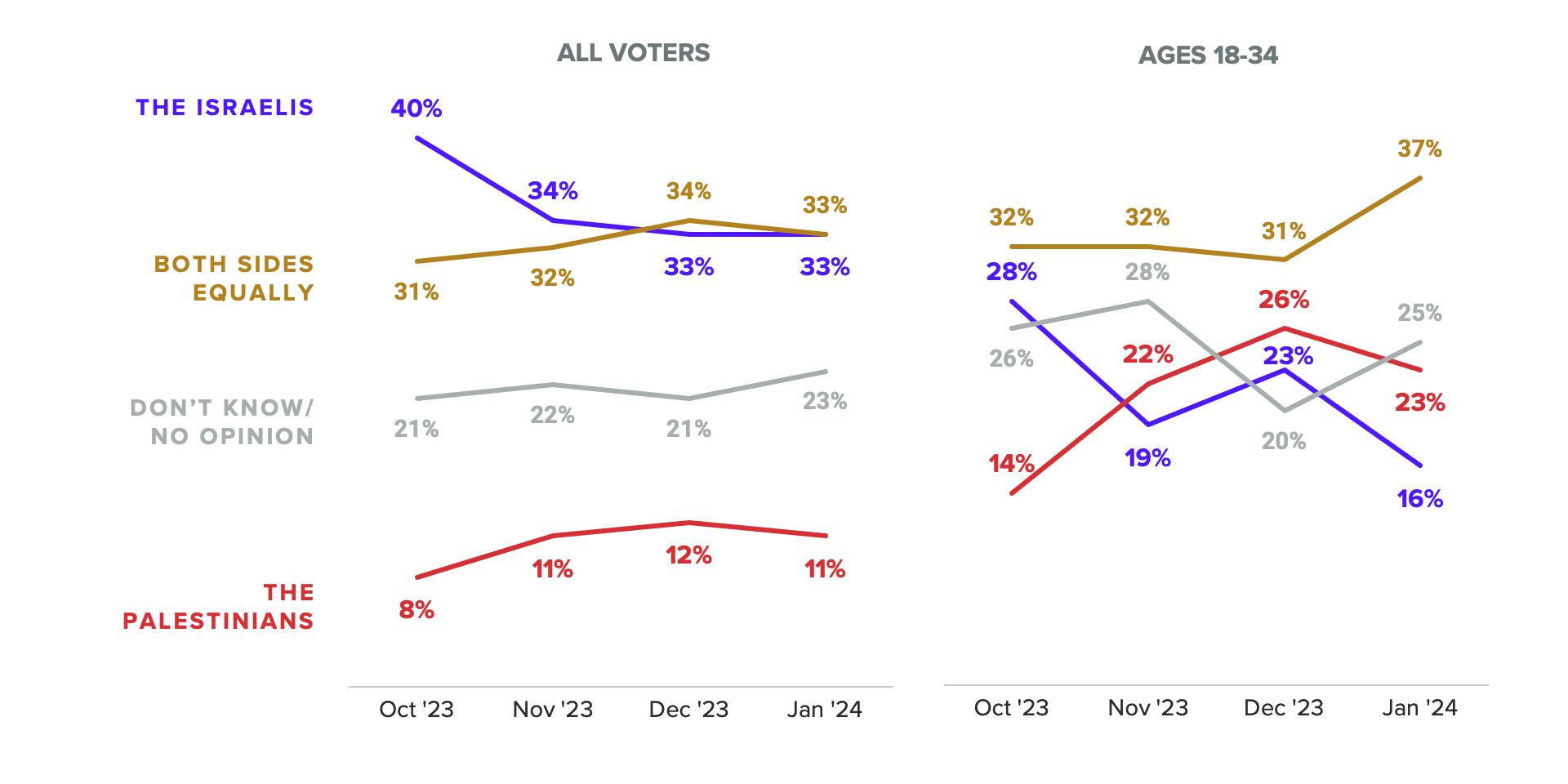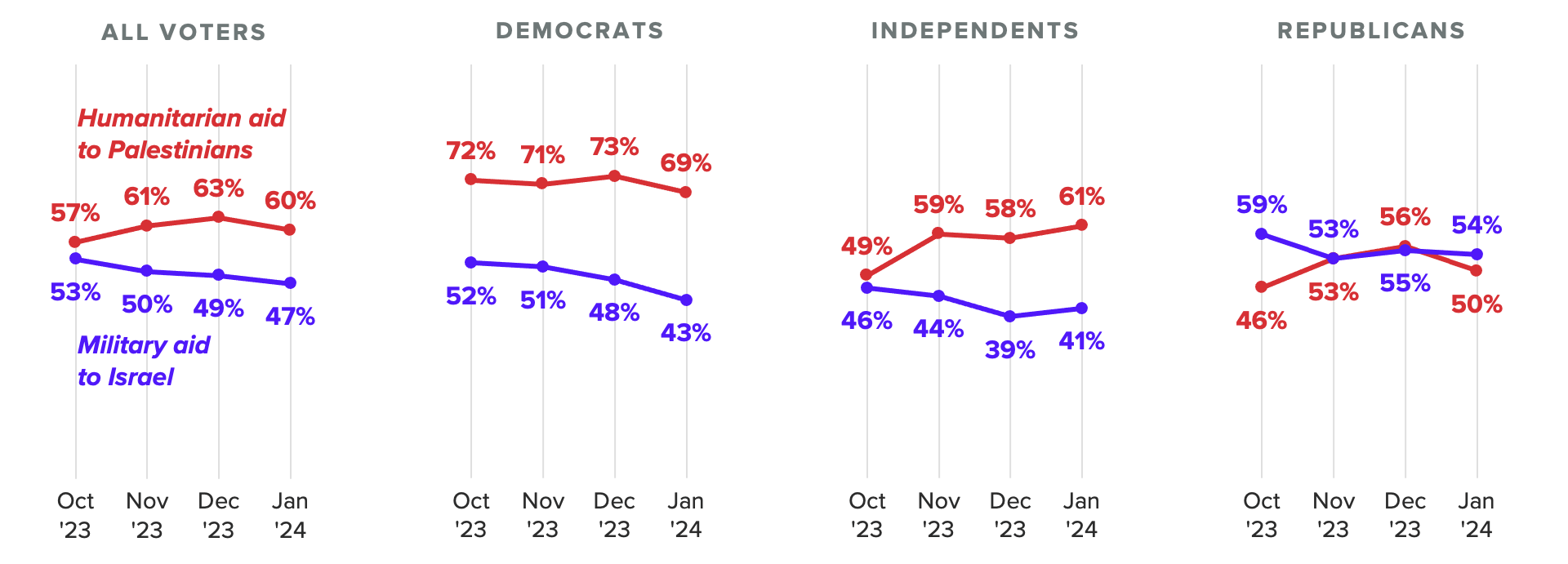Growth in Sympathy for the Palestinians May Have Hit a Wall

Data Downloads
Sign up to get the latest data and analysis on how business, politics and economics intersect around the world.
The American public’s increasing sympathy for the Palestinian people amid Israel’s ongoing military campaign appears to have hit a wall.
According to our tracking of public sentiment about the conflict, the monthly growth in sympathy toward the Palestinians in the months since October — driven in part by young people — has plateaued: Voters remain as likely to say they stand with the people of Israel as they are to say they support both sides equally.
Increased Sympathies for the Palestinians May Have Hit a Wall

Our latest survey, which was conducted Jan. 17-19, found that a third of voters said they sympathize with the Israelis, matching the share who said both sides equally. Both shares have remained relatively flat since November 2023, as has the share expressing more sympathy for the Palestinians (11%).
However, among the youngest voters (those ages 18-34), the share expressing sympathy for both sides equally has increased for the first time since October, from 31% in December to 37% this month. This came as the share expressing sympathy for the Palestinians declined slightly from 26% to 23%, and the share who said the same of the Israelis fell from 23% to 16% — marking a record low.
While full-throated support for the Palestinians plateaued, the largest shift among young voters was away from clear support for Israel towards equally supporting both sides, indicating a continuing loss of support for Israel among this group as the conflict grinds on.
This shift among the youngest voters comes even as awareness of news about Hamas’ attack on Israel has declined since the immediate aftermath. Compared with the earlier survey, which was conducted Oct. 21-23, these voters are now 10 percentage points less likely to report having seen, read or heard some or a lot about the Oct. 7 attack (70% to 60%), suggesting that future shifts may be less drastic as media attention wanes.
What voters want to see the United States do
Despite the increasingly static nature of voters’ sympathy, humanitarian assistance for the Palestinians remains more popular than military aid for Israel as Congress continues to debate sending funding.
U.S. Aid to Palestinians Is More Popular Than Israeli Military Assistance

Our January survey found that 60% voters support humanitarian aid to Palestinians such as health care, food and water, shelter and other safety measures for victims, compared with 47% who said the same of military assistance to Israel after a steady decline in support since October. Democrats and independents are far more likely to back civilian relief despite some pushback from the right on Capitol Hill, as are the youngest voters — though older voters are still less likely to support military assistance.
The bottom line
The Israel issue is clearly a problem for Biden: 49% of all voters and 52% of those aged 18-34 say they distrust Biden to handle the conflict. Electorally, the Democrat has seen his standing against former President Donald Trump slump among the youngest cohort since the conflict began, helping to drive his likeliest Republican rival’s slight lead in our daily tracking of the contest.
Moving forward, the data suggests policymakers in Washington may not feel as intense pressure to extend military support to Israel as they consider a supplemental spending package for national security priorities such as the U.S.-Mexico border, Israel and Ukraine.
When it comes to voters’ top priorities for this year’s elections, our 2024 general election tracker shows the conflict in Gaza ranks just slightly above the share who see the war in Ukraine as “very important.” The gap is a bit wider among younger voters. But the Biden administration’s involvement in negotiations over a temporary pause in the conflict — something some officials argue could lead to an eventual ceasefire — could decrease the salience of the issue.
This could give Biden a fighting chance to refocus an important part of his 2020 winning coalition on issues more favorable toward him as Trump comes closer to clinching the nomination amid his primary victories.
Eli Yokley is Morning Consult’s U.S. politics analyst. Eli joined Morning Consult in 2016 from Roll Call, where he reported on House and Senate campaigns after five years of covering state-level politics in the Show Me State while studying at the University of Missouri in Columbia, including contributions to The New York Times, Politico and The Daily Beast. Follow him on Twitter @eyokley. Interested in connecting with Eli to discuss his analysis or for a media engagement or speaking opportunity? Email [email protected].